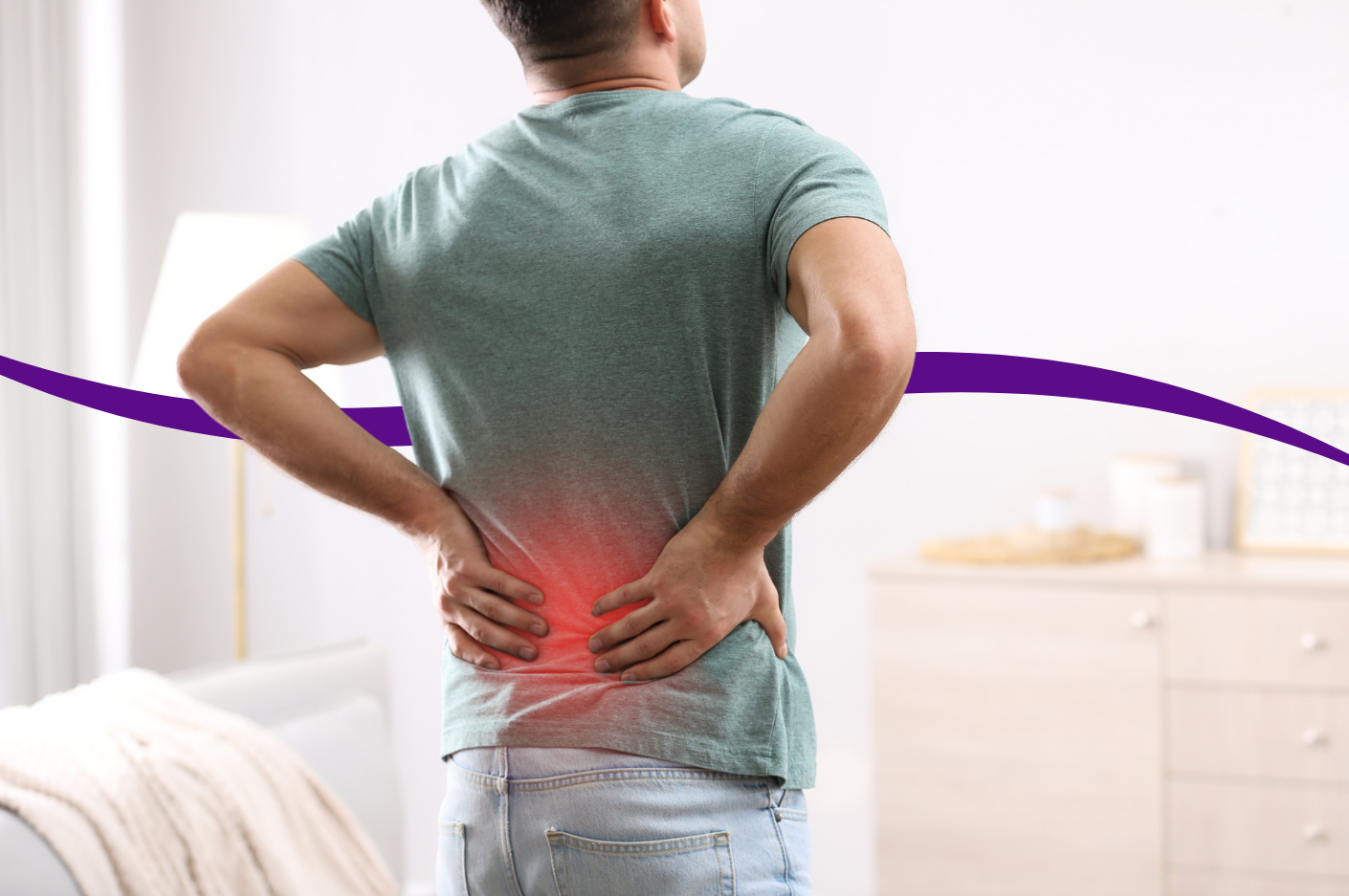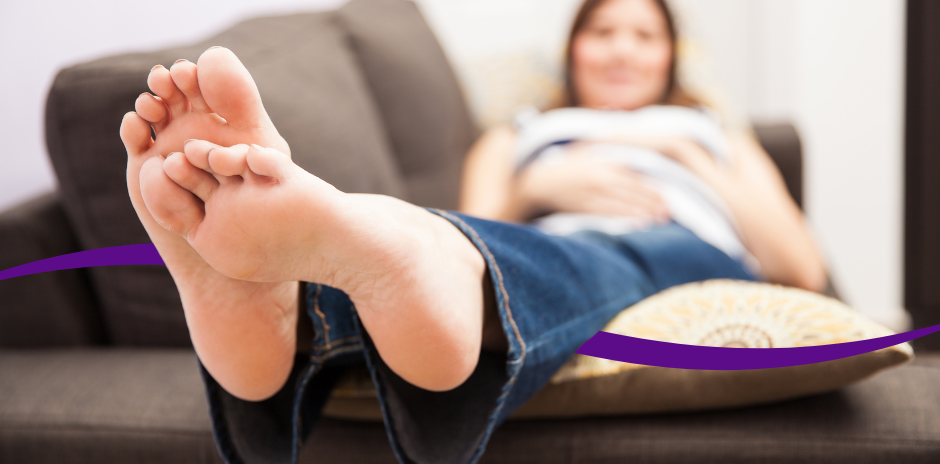

Pregnancy is an exciting journey and an incredible testament to the power and ability of the human body. During pregnancy, the
uterus grows approximately 500 times its original size,
a mother’s blood volume increases anywhere between 20-100%, and the body is flooded with hormones
that best prepare the hips and body for childbirth.
The profound changes the body faces also give rise to a myriad of unique challenges, one of which is the swelling of the feet and
ankles
that begins as early as the second trimester. Foot and ankle swelling affects 4 in 5 women at some point during their pregnancy. It can not
only feel uncomfortable, but may also limit a woman’s ability to wear normal sized shoes comfortably, or stay active on her feet.
Also known as edema, having swollen feet or ankles while you’re pregnant means that you have excess fluid that has
accumulated in the tissues. Don’t worry, excess fluid is generally a normal part of pregnancy (unless you have preeclampsia, see
below), given that the body needs to accumulate more fluid to best support the growing baby. To best understand how and why lower leg
swelling develops, we have to think about what’s happening inside, particularly around the uterus.
As the uterus rapidly grows with your baby, it places increased pressure on the surrounding blood vessels, including the vena cava, a large
vein that travels up the thigh and leg and is responsible for returning deoxygenated blood from the lower body, back up to the heart. This
pressure from the uterus impedes the smooth flow of blood, particularly from the legs and feet, which can lead to fluid accumulation in the
surrounding tissues - most often in the feet and ankles. The increase in blood volume that we mentioned earlier means there’s also a
much higher demand on the veins, making swelling even more likely, as can the pressure from the uterus on the pelvic floor.
The expanding uterus also affects the lymphatic system, responsible for maintaining fluid balance in the body. Hindered lymphatic function,
coupled with hormonal changes, both contribute to fluid retention and hence swelling. Additionally, the increase in progesterone in the body
(as a normal and healthy part of pregnancy) can also relax blood vessel walls, potentially increasing their permeability and causing fluid
leakage into the tissues.
The impact of the growing uterus extends beyond the circulatory and lymphatic systems to the pelvic floor muscles. As these muscles bear the strain of supporting the uterus, they may influence venous return from the lower extremities, further contributing to swelling in the feet and ankles. The culmination of these interconnected factors underscores the complexity of pregnancy-related foot and ankle swelling, emphasising the need for comprehensive approaches to alleviate discomfort and support the well-being of expectant mothers.
Preeclampsia is a dangerous pregnancy complication that can endanger both mum and baby. A key characteristic of preeclampsia is sudden swelling in the feet and hands, as well as the legs, face or entire body. If your onset of swelling is sudden, is affecting other areas of your body, or you have other accompanying symptoms to your swelling such as high blood pressure or protein in your urine, you should see your doctor or midwife immediately to rule out preeclampsia.
With many of our team members here at The Feet People also being mothers that have gone through pregnancy (both single and twin pregnancies!), here are our tried and true strategies for keeping your foot and ankle swelling under control at home.
Medical-grade compression stockings are designed to apply gentle yet effective pressure, helping to reduce swelling by promoting vein
function and blood flow. These stockings provide the most pressure at the ankle and gradually decrease towards the knee or thigh. They can
be worn throughout the day and are particularly useful for individuals who are still spending long periods on their feet.
Medical grade compression stockings can be purchased from the chemist, where they will measure the circumference around your feet and ankles
to help you get the right size with the correct mmHg rating (e.g. 15-20mmHg). It’s important to note that these are not the same
compression stockings designed for general sports wear, for example.
We have personally found compression stockings to be an extremely effective way of both managing existing pregnancy swelling in the feet, ankles and legs, as well as working as a preventative measure to help prevent swelling from starting that day by putting them on first thing in the morning.
This may be the simplest, yet effective way to help reduce pregnancy foot and ankle swelling. By raising the legs above heart level
whenever possible, the veins in the legs don’t have to work nearly as hard to move fluid from the legs back up the body, so
you’re essentially getting gravity assisting you in reducing fluid accumulation. This can be achieved by propping the feet up on a
cushion while sitting or lying down.
One of our team members recently had significant leg swelling in hospital following childbirth, and was able to keep it completely managed
by elevating the leg side of the bed upwards relative to her hips, forming a slight ‘V’ shape with the body. It also acts fairly
quickly, with her elevating her feet for the first time before a one-hour nap and waking with her legs and feet looking and feeling much
better.
Additionally, other ways to help with fluid retention include:
While for the most part, you have everything you need to help effectively manage your pregnancy-related foot and ankle swelling at home, there are a number of ways that your podiatrist can help you with supporting your foot health in general. This is a time when there is great pressure being placed on your feet daily, and other changes are occurring - such as your body’s centre of gravity shifting forwards as your belly grows bigger. Our podiatrist see women throughout their pregnancy to help with a range of problems and conditions, such as:
Book your appointment with our podiatry team online
here
or call us on (07) 3356 3579.
| Monday | 7:40am - 6:00pm |
| Tuesday | 7:40am - 6:00pm |
| Wednesday | 7:40am - 6:00pm |
| Thursday |
7:40am - 6:00pm |
| Friday | TEMP CLOSED |
| Saturday | CLOSED |
| Sunday | CLOSED |
Ground Floor, 344 Queen Street,
Brisbane City QLD 4000
| Monday | 7:40am - 6:00pm |
| Tuesday | 7:40am - 6:00pm |
| Wednesday | 7:40am - 6:00pm |
| Thursday |
7:40am - 6:30pm |
| Friday | 7:40am - 5:00pm |
| Saturday | 7:40am - 4:30pm |
| Sunday | CLOSED |
Newmarket Village, 114/400 Newmarket Rd, Newmarket QLD 4051